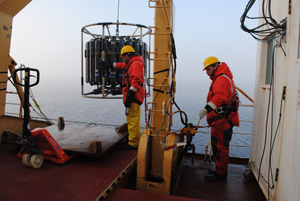Please note: You are viewing
the unstyled version of this website. Either your browser does not support CSS
(cascading style sheets) or it has been disabled. Skip
navigation.
Dr. Mary-Louise TimmermansAugust 10, 2011Peter Lavrentyev (University of Akron, Ohio) is taking part in the expedition this year to investigate biological primary production and the microbial food web of the Beaufort Sea. Changes in the physical Arctic environment affect the amount of biological primary productivity, and the composition and fate of the primary producers (i.e. phytoplankton). Arctic seabirds and marine mammals require efficient transfer of energy from phytoplankton to zooplankton to fish, and this can vary greatly as the climate changes and sea-ice cover decreases. Recent studies have shown a dominance of increasingly smaller phytoplankton as surface temperatures and the stratification of the Arctic Ocean increase; this change in composition of the primary producers is likely to have significant implications to the Arctic ecosystem. The study of Peter and his colleagues focuses on tiny zooplankton (microzooplankton), which provide the food-chain link between phytoplankton and fish, seabirds and marine mammals. Peter, Jennifer Putland (University of Akron) and Kelly Young (IOS) are collecting and preserving samples from both Rosette casts and net tows to perform microscopic, and molecular analyses of microzooplankton, phytoplankton and bacteria. One of their goals is to understand the food-web interactions between microzooplankton and larger zooplankton, such as calanoid copepods. Using a temperature-controlled incubator on the foredeck of the Louis, they are investigating the growth and grazing mortality rates of plankton. Peter, Jennifer and Kelly’s work on this cruise will be a valuable contribution to our understanding of the lower levels of the Beaufort Sea food chain and how the microbial food web is changing with sea-ice loss. Last updated: October 7, 2019 | |||||||||||||||||
Copyright ©2007 Woods Hole Oceanographic Institution, All Rights Reserved, Privacy Policy. | |||||||||||||||||



